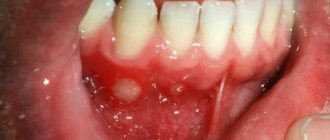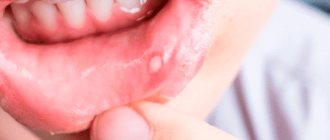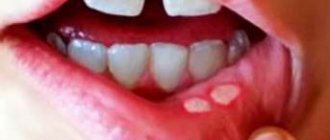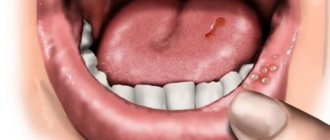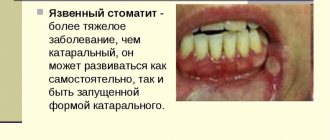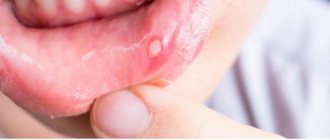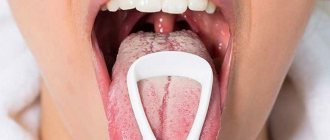Causes
Herpetic stomatitis, or as it is also called aphthous stomatitis, is dangerous, first of all, for young children. It is a serious viral disease, which, in addition to damaging the oral mucosa, causes general intoxication of the body and provokes malfunctions of the nervous, immune, and reticuloendothelial systems.
Herpes, which is the causative agent of the disease, may not make itself felt for a long time, although infection usually occurs in early childhood.
In the photo, herpetic (cold sore) stomatitis in an 8-year-old child
When the baby’s immunity is weakened, the herpes virus is activated and begins to multiply, causing an increase in temperature, enlargement of the submandibular lymph nodes, acute inflammation of the mucous membrane, and the formation of bleeding and painful ulcers on its surface.
Main reasons:
- decreased baby's immunity;
- previous infectious diseases;
- lack of vitamins;
- insufficient oral hygiene;
- direct contact with patients with herpes stomatitis.
Infants are more likely to become infected with the herpes virus during childbirth, provided the mother has a herpes infection. In children under one year old and school-age children, the virus is activated against the background of an organism weakened by disease and vitamin deficiency.
Manifestation of pathology
This pathology has one main cause of formation - the herpes virus. However, there are factors that provoke the development of pathology. These include the following reasons:
- mechanical injuries to the mucous membrane;
- burns or dryness of the oral mucosa;
- poor hygiene;
- periodontal diseases;
- hormonal disorders;
- stressful situations;
- poor quality food.
Viral stomatitis can appear against the background of any disease that reduces the human immune system, for example:
- gastritis;
- colitis;
- sinusitis;
- tonsillitis;
- parasitic infestations.
You can become infected with herpes through shared utensils, contact with a sick person, and in any public place. Children under three years of age, adolescents and young adults are especially susceptible to the disease.
Primary infection is characterized by its own characteristics: an acute form of pathology develops. The disease is accompanied by hyperthermia, the general condition worsens, headache and signs of malaise appear. The patient's appetite decreases, the lymph nodes under the jaw swell, and painful sensations appear in the oral cavity. Multiple blisters form on the entire surface of the mucosa.
If the acute form of the pathology is not cured, the disease will take a recurrent form and will constantly appear. Chronic stomatitis is characterized by periodic relapses that appear against the background of a weakening of the body's defenses. That is, the infection is in a “dormant state” until conditions are favorable.
Note! Herpetic stomatitis can occur due to the use of toothpaste with sodium lauryl sulfate.
Let us consider the symptoms characteristic of acute and chronic forms of herpetic stomatitis, as well as the features of the manifestation of pathology with varying degrees of damage to mucosal tissues.
Main symptoms and signs of the disease
Acute herpetic stomatitis in children develops gradually and is preceded by an incubation period lasting from two days to 3 weeks.
Early symptoms of the disease are:
- burning in the mouth;
- increased salivation;
- headache, nausea, general weakness;
- increased body temperature;
- enlargement of the submandibular lymph nodes;
- the appearance of bad breath.
If the parents do not respond to the first signs, after a few days the mucous membrane becomes covered with multiple rashes. Small painful blisters itch, respond with acute pain to the touch, and when they rupture, a cloudy liquid flows out of them. The rash appears on the baby’s gums, cheeks, tongue, lips, and wings of the nose.
Herpes stomatitis can affect not only a school-age child, but also an infant.
The mild form of the disease can be easily treated at home; in moderate and severe forms, hospitalization of the small patient is indicated.
Symptoms
Let's look at the symptoms of stomatitis and herpes separately.
Stomatitis
As a rule, stomatitis at an early stage of the disease is practically invisible. There are no painful sensations in the tongue. There may be a slight deterioration in appetite, slight fever and general lethargy. However, depending on the type of food eaten, as well as some other factors such as weather conditions, rest mode, minor pain may appear in the area of the tongue and cheeks.
Also at this stage, dry mouth, itching, and burning are observed.
At the next stage of the disease, a white coating and ulcers begin to form on the affected areas, painful sensations appear and intensify, and general lethargy and apathy increase.
If treatment is neglected, the disease can become severe. In this case, the patient will need urgent medical intervention and hospitalization. Characteristic signs of this stage are:
- heat;
- swollen tongue, which in turn causes suffocation;
- the formation of painful wounds and ulcers, their spread throughout the entire oral cavity;
- speech defects;
- general weakness, apathy, lethargy.
Since it is children who most often suffer from this disease in its severe manifestations, their symptoms are more pronounced than in adults. In addition, the child may complain of a sour taste in the mouth and an unpleasant odor.
Herpes
Herpes manifests itself somewhat differently. People of absolutely all ages have similar symptoms:
- the appearance of blisters, which in turn gradually develop into small ulcers;
- painful sensations in the affected areas.
As a rule, within a few days, during the normal course of the disease, the ulcers disappear. Only in case of complications is observed:
- general lethargy;
- low-grade fever;
- irritability;
- loss of appetite.
Ulcers in the oral cavity almost never become covered with crusts, due to the fact that saliva washes away their contents, that is, in fact, constant disinfection of foci of infection occurs. It is possible to predict in advance the places of formation and development of this disease. The following signs will indicate the occurrence of herpes:
- itching - especially worse after eating specific foods, such as fruits, vegetables, acidic foods;
- redness and swelling - like any other inflammation in the body;
- numbness and slight tingling - occurs precisely in the areas of future formation of ulcers and blisters.
Thus, by studying the detailed symptoms, it is possible to detect the presence of these infections in a person and identify which one affected him. According to the latest statistics, more than 80% of the world's population suffers from herpesvirus, so this disease is more common.
Classification and diagnosis
Herpetic stomatitis is classified both according to the severity of the disease and the characteristics of its course.
According to the characteristics of the course, acute and chronic (recurrent) forms are distinguished. Acute stomatitis is characterized by a sudden onset, pronounced symptoms, and rapid development. Without proper treatment, it quickly becomes chronic and can drag on for years, periodically exacerbating.
Based on the degree of severity, there are mild, moderate, and severe forms.
In mild forms, the following are noted:
- slight increase in body temperature;
- redness, swelling, inflammation of the gums;
- swollen lymph nodes;
- a small number of painful ulcers.
The average degree is characterized by:
- significant increase in body temperature;
- general weakness, nausea, headache;
- inflammation of the oral mucosa;
- the appearance of a blistering rash on the inner surface of the cheeks, gums, tongue, and around the mouth.
The severe form causes:
- temperature rise to a critical level;
- lymphadenitis of the cervical, submandibular lymph nodes;
- a sharp disturbance in general well-being;
- the appearance of severe muscle pain, headache;
- nausea, vomiting;
- multiple rashes that spread to the eyelids, conjunctiva, and perioral area.
Diagnosing the disease is not difficult for an experienced doctor. It is based on an analysis of the main symptoms, the order of clinical manifestations of the disease, the nature, and multiplicity of ulcers.
It is necessary to differentiate herpetic stomatitis from viral stomatitis; for this, in the first few days of the disease, a cytological examination of scrapings from erosions and aphthae should be done.
Recurrent herpetic stomatitis
Recurrent herpetic stomatitis is mainly a consequence of herpes. Studies have shown that 80% of people who have had this infection remain carriers of the virus for life. Herpes persists in the nodes of nerve cells and, in a favorable environment, manifests itself as stomatitis. The causes of this pathology may be:
- hypothermia;
- overheat;
- great physical activity;
- operations.
The disease may have an incubation period of several weeks. Redness appears on the mucous membrane, causing burning and itching. After a few hours, the affected areas become covered with blisters, which turn into erosion, without swelling.
During the pathology, the patient experiences weakness, aching joints, and muscle pain. Body temperature may also rise and nervousness may appear.
How long does the disease last and how many days is the child contagious?
Depending on the complexity of the form, herpes stomatitis in children lasts from several days to 2-3 weeks. With a mild form, the main symptoms disappear on the third or fourth day, treatment of a moderate form takes one to two weeks. The severe form is the most dangerous; healing lasts for weeks and requires mandatory hospitalization of the baby.
The disease is characterized by a high degree of contagiousness precisely during the period of exacerbation.
The infection is transmitted by airborne droplets (including through kissing), when using shared dishes, cutlery, toys, and hygiene items.
Herpes is contagious and can easily be transferred to healthy parts of your own body.
It is necessary to wash your hands thoroughly after treating the surface affected by the sores with medications to prevent the spread of the virus.
How and with what to treat herpetic stomatitis in children
As Dr. Komarovsky notes, treatment of herpetic stomatitis in children, regardless of age, depends on the severity of the disease, the general condition of the patient’s immune system, and the presence or absence of concomitant diseases.
The main question that interests young parents is which doctor should they contact if they suspect herpetic stomatitis. Both a qualified pediatrician and a dentist can advise the child.
Therapeutic methods include both general and local treatment. Common activities include:
- prescription of antiviral drugs (acyclovir, Zovirax, Herpevir, Virolex);
- taking antipyretic and painkillers (paracetamol, Panadol, Eferalgan, Tylenol);
- prescription of antihistamines (diazolin, claritin, erius, fenistil);
- correction of the immune system (immudon, sodium nucleinate);
- vitamin therapy (vitamin C, ascorutin, multivitamins, B vitamins).
Children of older preschool and school age are recommended to be treated with broad-spectrum antibiotics to avoid possible complications.
For newborns and infants, antibiotic therapy is prescribed only as a last resort, with preference given to local therapy:
- applications of painkillers (solution of lidocaine, trimecaine, pyromecaine);
- treating the baby’s oral cavity with antiseptics (solutions of furatsilin, potassium permanganate, brilliant green, blue);
- Treatment of aphthae with iodine should be avoided, as it causes a burn to the mucous membrane;
- the use of antiviral medications in the form of ointments, lotions, solutions (interferon, acyclovir);
- applying an oil solution of vitamin A, sea buckthorn or rosehip oil, solcoseryl to the mucous membrane of the baby’s mouth).
If the symptoms of the disease do not disappear on the 3-4th day of treatment, but only intensify, the child is indicated for treatment in a hospital setting, otherwise stomatitis will become chronic, from which it is impossible to get rid of it.
Treatment with folk remedies at home
When treating herpes stomatitis in children, it is extremely important to prevent the development of complications and transition to a chronic form. Therefore, all folk remedies are auxiliary in nature and should not replace full treatment.
To strengthen the child's immunity, a decoction of echinacea leaves, ginseng root, and rose hips is well suited.
Rinsing will help relieve itching, burning and pain. For these purposes, you can use decoctions of chamomile flowers, sage, calendula inflorescences, St. John's wort, alder cones, rose petals, and oak bark.
The healing of ulcers and aphthae is facilitated by treating their surface with brilliant green, blue and iodine; they have a drying effect. An alcohol solution of propolis helps well, it relieves the inflammatory process and has an analgesic effect on the oral mucosa. Use with caution to treat small children.
Newborns and infants are recommended to lubricate the inflamed oral mucosa with natural honey. This should be done with extreme caution, since honey is a fairly strong allergen.
Treatment methods
When the first symptoms of the disease appear, you should immediately visit the dentist. He selects therapy in accordance with the severity of herpetic stomatitis. The patient separates his hygiene items and personal belongings, preventing them from being used by other people. He needs to eat from a separate container. The disease is eliminated with medications and folk remedies. The treatment of herpetic stomatitis in adults is suitable depending on the patient’s condition.
Drug therapy
In the medical treatment of herpetic stomatitis, antiseptic and disinfectant drugs are used. The treatment regimen includes:
- external treatment – eliminates pain and accelerates healing of the oral mucosa;
- systemic effect on the virus - aimed at combating the causative agent of the disease;
- maintenance therapy – reduces the risk of relapses and strengthens the immune system during remission (relief of symptoms).
Systemic treatment in adults includes following a diet and taking vitamins. The patient is prescribed Acyclovir.
Particular attention is paid to the drinking regime. Drinking liquid helps relieve intoxication (poisoning). The patient is prescribed antiviral drugs - Famciclovir and Imudon.
For external treatment, rinses are prescribed to relieve inflammation. Solutions are prepared based on:
- "Miramistina".
- "Kamistada".
- "Stomatidina."
The procedure is carried out regularly, every 4 hours. This measure increases the effectiveness of treatment. When blisters appear on the lip, use Silicea gel or Viferon ointment for local treatment.
ethnoscience
Bonaftone and florenal ointments help prevent the development of inflammation. The mouth is rinsed with the following means:
- Kalanchoe juice;
- flax oil;
- propolis tincture;
- carrot and cabbage juice;
- sea buckthorn oil.
In severe cases, in addition to prescribed medications for the treatment of herpes stomatitis, the patient takes vitamins.
Possible complications
Primary infection with herpetic stomatitis is highly treatable. Within 7-10 days, with proper treatment, the child can fully recover. Without appropriate drug therapy, the following complications may develop:
- herpetic keratoconjunctivitis (a dangerous herpetic eye infection that leads to blindness);
- dehydration (due to refusal to eat and drink).
To avoid undesirable consequences, it is necessary to consult a doctor at the first symptoms of the disease, strictly adhere to all instructions, give the baby plenty of fluids, monitor oral hygiene, and wash your hands after each treatment of a surface affected by herpes.
Prevention in children
Preventing infection with the herpes virus is extremely difficult, since 90% of the population are carriers of it. It is important to delay infection as much as possible; the younger the child, the more difficult the disease is to tolerate. It is necessary to avoid contact with people who have an acute herpes virus. From infancy, the baby should be taught to use personal hygiene products, not allowed to drink from someone else’s mug after someone else, or to use used spoons, forks, and plates. You should not kiss someone who has a herpetic sore on their lips.
To prevent herpetic stomatitis, you need to do general strengthening of the child’s immune system, systematically give him B vitamins, multivitamin complexes, and carry out hardening procedures.

